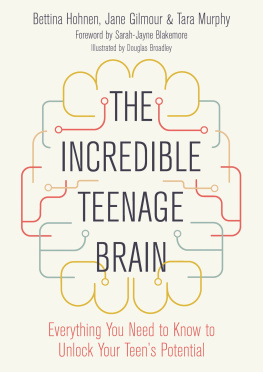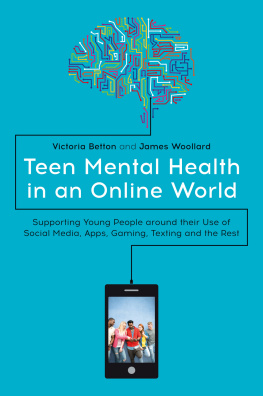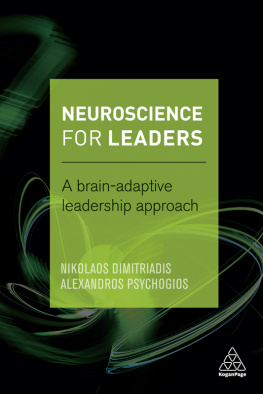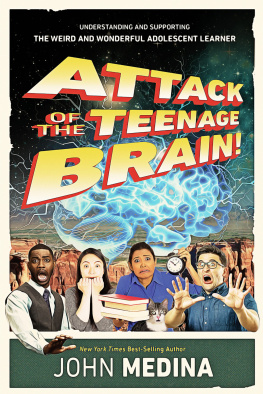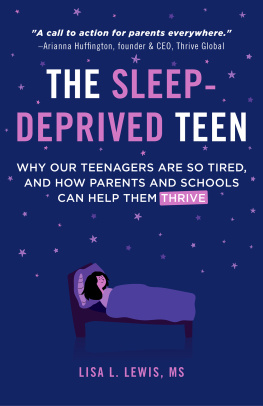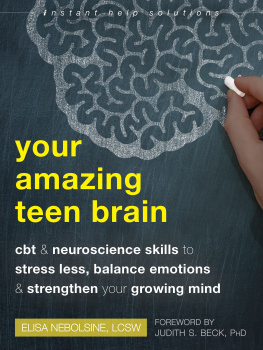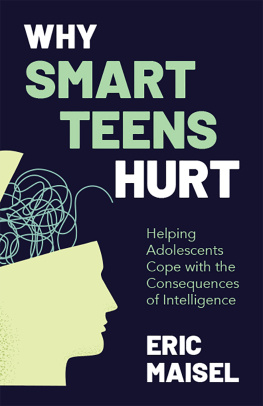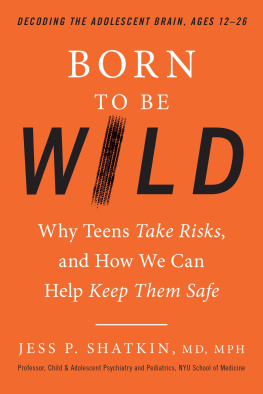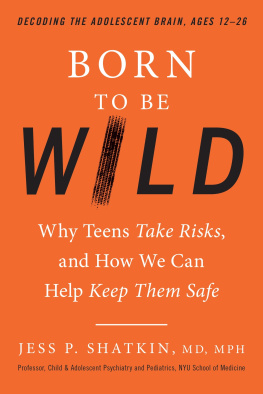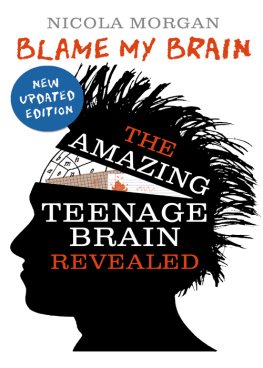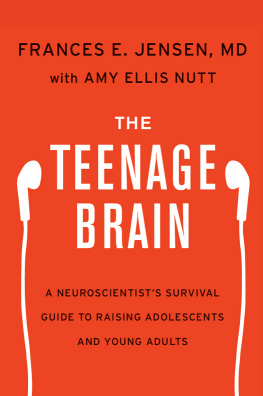
The Incredible
Teenage Brain
Everything You Need to Know to
Unlock Your Teens Potential
Bettina Hohnen,
Jane Gilmour & Tara Murphy
Illustrated by Douglas Broadley
Foreword by Sarah-Jayne Blakemore

Jessica Kingsley Publishers
London and Philadelphia
Contents
Foreword
Adolescence comes from the Latin word adolescere , which means to grow up. Adolescence starts with the physical and hormonal changes of puberty and ends with adult independence, and it is a time of change: changes to hormones and the body, changes in the social environment and changes to the brain and the mind.
Changes in behaviour that are particularly common during adolescence are increased risk-taking, novelty seeking and being influenced by peers. These typical adolescent behaviours are natural and adaptive processes that help us develop into fully independent adults and are seen in other species of animals, in many different cultures and throughout history. More than 2000 years ago, Socrates wrote, They have bad manners, contempt for authority; they show disrespect for elders and love chatter in place of exercise. One hundred years or so later, Aristotle described youth as lacking in sexual self-restraint, fickle in their desires, passionate and impulsive Youth is the age when people are most devoted to their friends, highlighting the notion that adolescence is a period of fluctuating and intense emotions, in addition to a changing social landscape at this time of life.
For a long time, it was thought that the human brain stops developing in childhood. However, over the past two decades, brain scanning studies have shown that the human brain continues to develop both in terms of structure and function throughout childhood and adolescence, and even into early adulthood (see Tamnes et al. 2017 and Fuhrmann, Knoll and Blakemore 2015). Sensory and motor cortices involved in perception and movement mature earlier than other regions, such as the prefrontal, parietal and temporal cortices, which are involved in higher-level cognitive processes and continue to develop into the 20s or 30s.
At the same time that the brain, the body and the social environment are undergoing substantial change, so is the mind. Cognitive skills such as planning, inhibiting inappropriate behaviour and certain forms of memory also continue to improve during adolescence. These cognitive advances provide adolescents with the cognitive machinery to reflect on themselves, what others think about them, and their futures. This is a necessary part of becoming an independent adult, but it also places new pressures on the developing person. Some adolescents may also be vulnerable to experiencing emotions that are hard to manage, or develop mental health problems like anxiety, depression and eating disorders. But the development of the brain in adolescence makes it particularly susceptible to change and that renders this period of life an opportunity for learning and creativity, as well as intervention and rehabilitation.
I have studied the adolescent brain and behaviour for 17 years and am often asked what these mean in terms of parenting or teaching young people. As a cognitive neuroscientist, I feel unqualified to give this kind of advice, and I have been searching for a book that interprets the latest science in terms of what it means for parenting and teaching. This book does exactly that. The authors describe the science in a compelling and clear way, and then place the science in the context of real-life examples of adolescent behaviour and development. How do you handle your teenager wanting to spend more time with friends, taking risks, staying up late? Should you worry about the amount of time they spend on social media? Why wont they go to bed at a reasonable time and why do they find it hard to get up in time for school? When does anxiety become something to seek professional help about? What about other mental health problems like depression and self-harm? This book provides a deep understanding of everyday adolescent issues that touch the lives of everyone who lives or works with teenagers and provides suggestions for how to deal with these.
The authors are child and adolescent psychologists and, between them, have a vast amount of experience working with young people and families. In this ground-breaking book, they provide their combined expertise to help parents and teachers get it right. Adolescence can be a turbulent and challenging time for the adolescent themselves, as well as for the people taking care of them. This is a manual for parents, teachers and anyone supporting adolescents, but it is much more than that, with each issue being deeply seated in scientific rigour. The authors are careful not to oversell the data and are cautious where the science just isnt there yet. But where there is evidence, this book explains what the science shows, how the brain and mind change in adolescence and how this knowledge can be used in positive ways to help young people flourish.
Sarah-Jayne Blakemore, PhD, FRSB, FBA
Professor of Cognitive Neuroscience
University of Cambridge, UK
Introduction
The Incredible Teenage Brain will change how you interact with the teenagers in your life. It will open your eyes to a whole new way of understanding young people and the incredible teenage brain.
We felt compelled to write it, because we are so inspired by the young people in our professional and personal lives. It reflects a seismic shift in the scientific communitys perception and understanding of young people, whereby adolescence is coming to be viewed as a time of great opportunity, as well as great sensitivity, and of enormous potential for change. In the past 10 years or so there has been an explosion of research investigating the teenage brain and its unique and positive attributes. There are many pieces of research, books, press articles and radio and TV programmes describing these extraordinary findings so this book is most certainly standing on the shoulders of giants.
What we do here, for the first time, is take this cutting-edge body of knowledge a step further and consider what it means in a day-to-day context. What can you, as the adult supporting a teenager, do to create the environment that will allow that young person to capitalise on their gifts? At the same time, how can you protect and support them where it is needed, and shore up their vulnerabilities?
One of the most important messages from the latest research is that teenagers are at the height of their learning potential. Here we see learning as a broad concept, beyond but including the school curriculum. Getting the most from formal education, establishing new skills like playing an instrument, developing the ability to navigate social situations, learning to persist with challenges, acquiring emotional self-regulation and developing well-being habits, these are all equally valid learning experiences. Teens have a phenomenal capacity to learn from the environment.
In fact, the teenage phase is increasingly described as the new 0 to 3 years because adolescents explore and learn at the same extraordinary rate that babies and toddlers do. But its a time-limited offer. After the brain is fully mature (by about the age of 25), we can still learn of course, but the flexibility and capacity to learn whether through study, or the experience of a life-learning lesson, or shifting an attitude, or an emotional experience with such mind-blowing speed is lost.
This means that you need to support your teen to get in through that closing door and invite them to engage with life in a way that is enriching and rewarding, during these important years. Making the most of this sensitive period in adolescence is a life-long investment that will continue to pay dividends throughout adulthood.
Next page
